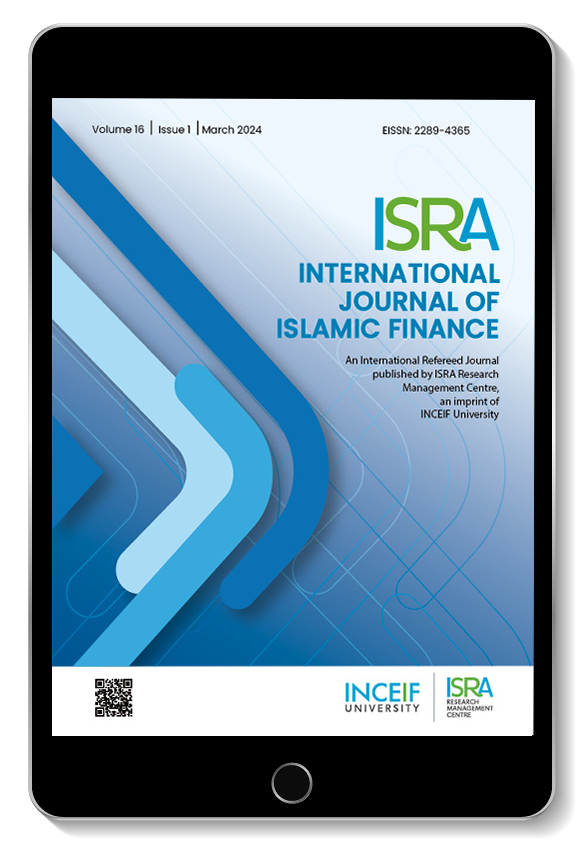Experts' views on ḥiyal in the Malaysian Islamic banks': the case of tawarruq-based deposit products
IF 2.8
Q2 BUSINESS, FINANCE
引用次数: 1
Abstract
PurposeThere are two purposes to this study: first, to identify the status of ḥiyal (legal trick) in the offering of deposit products based on the tawarruq contract in the Malaysian Islamic banking industry and second, to identify the reasons for the widespread offering of tawarruq-based deposit products by Malaysian Islamic banks (IBs). Both aims of the study are addressed from the viewpoint of Malaysian experts in the area of Islamic banking.Design/methodology/approachThe study used a qualitative method that involved interviews with Malaysian Sharī‘ah experts and Islamic banking operations experts.FindingsThe findings show that Malaysian IBs resolved to use the tawarruq munaẓẓam contract in deposit products due to several constraints in the existing banking system and in view of customer preferences.Research limitations/implicationsThis study solely focuses on tawarruq-based deposit products in the Malaysian Islamic banking industry, with no other products explored. The focus on tawarruq-based deposit products was due to the extensive application of tawarruq in Islamic banking deposit products that had also led to accusations against Islamic banking operations from various parties.Practical implicationsThe implication of the study is that more stringent procedures are required in the offering of tawarruq-based deposit products as they are extensively utilised and have sparked controversy among Sharī‘ah scholars. Moreover, to retain Malaysia's Islamic banking reputation and trustworthiness, new and less controversial contracts must be developed.Originality/valueThis paper discussed the extensive usage of ḥiyal-based contracts such as tawarruq in Islamic banking institutions' deposit products, with justifications from Malaysian Islamic banking experts. The widespread use of the tawarruq munaẓẓam contract in deposit-based product offerings is based on a reasonable view considering the constraints that Malaysian Islamic banking is currently facing, with strict operation procedures by Bank Negara Malaysia to ensure real operations and to avoid fictitious elements. This paper reveals the use of tawarruq munaẓẓam in deposit products which allows the Islamic banking industry to operate effectively under Malaysia's dominant conventional banking system.专家对马来西亚伊斯兰银行ḥiyal的看法:以tawarruq存款产品为例
目的本研究有两个目的:第一,确定ḥiyal(法律把戏)在马来西亚伊斯兰银行业提供基于tavarruq合同的存款产品,其次,找出马来西亚伊斯兰银行(IB)广泛提供基于tawarruq的存款产品的原因。这项研究的两个目的都是从马来西亚伊斯兰银行业专家的角度进行的。设计/方法/方法该研究采用了定性方法,包括采访马来西亚Sharī'ah专家和伊斯兰银行运营专家。调查结果显示,马来西亚IB决定使用Tavarruq munaẓẓ由于现有银行系统的一些限制以及客户的偏好,我在存款产品中签订了合同。研究局限性/含义本研究仅关注马来西亚伊斯兰银行业中基于塔瓦鲁克的存款产品,没有探索其他产品。对基于塔瓦鲁克的存款产品的关注是由于塔瓦鲁克在伊斯兰银行存款产品中的广泛应用,这也导致各方对伊斯兰银行业务的指控。实际含义该研究的含义是,在提供基于塔瓦鲁克的存款产品时需要更严格的程序,因为这些产品被广泛使用,并在Sharī'ah学者中引发了争议。此外,为了保持马来西亚伊斯兰银行业的声誉和可信度,必须制定新的、争议较小的合同。独创性/价值本文讨论了ḥ伊斯兰银行机构存款产品中基于iyal的合同,如tavarruq,马来西亚伊斯兰银行专家对此进行了辩护。tavarruq muna的广泛使用ẓẓ考虑到马来西亚伊斯兰银行目前面临的限制,基于存款的产品提供合同基于合理的观点,马来西亚国家银行有严格的操作程序,以确保真实的运营并避免虚构的元素。本文揭示了tavarruq muna的用途ẓẓ我的存款产品使伊斯兰银行业能够在马来西亚占主导地位的传统银行体系下有效运作。
本文章由计算机程序翻译,如有差异,请以英文原文为准。
求助全文
约1分钟内获得全文
求助全文
来源期刊

ISRA International Journal of Islamic Finance
BUSINESS, FINANCE-
CiteScore
3.40
自引率
17.40%
发文量
18
审稿时长
20 weeks
期刊介绍:
It is the aspiration of the editorial committee that IJIF achieves the highest rank in quality and substance. It is thus our aim that the journal be carried in the Thompson Reuters’ ISI and Scopus databases. By ensuring high standards in articles published in Islamic finance we ensure that further innovation and research is carried out and promoted in the Islamic finance industry and academia. IJIF publishes 2 issues per annum.
 求助内容:
求助内容: 应助结果提醒方式:
应助结果提醒方式:


